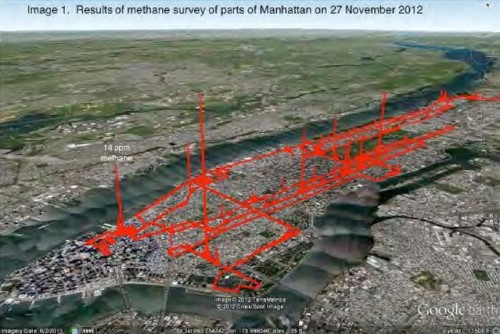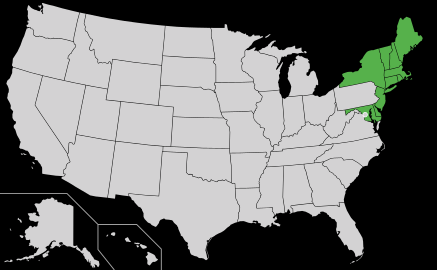Dramatic Decline Rates of 4 Gas Fields Confirmed by Industry Study
March 26, 2013Manhattan Natural Gas Pipeline Emissions Final Report
March 27, 2013The whole story – both reports and other media coverage.
The EPA Inspector General cited our extended NY report in his report on methane emissions.
PRESS RELEASE: for immediate release 3/25/13
MEDIA: New Study Exposes How Natural Gas Isn’t the Clean Fossil Fuel It’s Hyped up to Be (Nora Eisenberg for Alternet); The Methane Beneath Our Feet, (Bill McKibben in The New York Review of Books)
Actual Methane Emissions Measured in Manhattan Showing No Advantage to Natural Gas: Two Reports
Extended Report on Preliminary Investigation of Ground-Level Ambient Methane Levels
in Manhattan, New York City, New York
And this Preliminary Report which was presented to the New York City Council at a hearing and at the New York State Department of Health Gas Drilling Hearing. Download the Preliminary Report.
Report on a Preliminary Investigation of Ground-Level Ambient Methane Levels in
Manhattan, New York City, NY
December, 2012
Robert Ackley and Bryce F. Payne Jr. , PhD
Gas Safety, Inc., Southboro, Massachusetts
BACKGROUND
There are serious environmental concerns with the development of shale gas and the related new gas industry infrastructure, and recent investigations have raised concerns about the role of cities in assuring the public and environmental safety of natural gas use. In cities gas will be distributed and delivered through existing and new gas lines, almost all buried under city streets and sidewalks. In most U.S. cities the gas lines have been in place for decades. Consolidated Edison, Inc. (ConEd) in New York City, for example, has been installing gas lines underground since the early 1800s and now has a system of 4320 miles of gas pipe.1 ConEd has installed pipes under almost every street or sidewalk in their service territory (except northern Westchester). The ConEd gas system in the 23-square mile service area in Manhattan delivers gas through 336,000 customer gas meters. All underground pipes, as in the ConEd gas system, are subject to stresses and strains of corrosion, and physical damage during excavation or due to natural forces. It follows that such extensive, complex and largely aged pipe systems will have maintenance requirements and will develop leaks and other problems that have to be managed to prevent explosion hazards and property damage, e.g. to urban trees, and to assure public and worker safety.
In addition to the more obvious concerns about safety, (such as explosions and wasted gas) there is an additional concern that arises from the fact that commercial natural gas is almost entirely comprised of methane. This naturally occurring gas is formed deep in the earth during the geological processes that form oil and coal, and near or at the earth’s surface by biological processes, like decay of sewage, or in the gut of mammals. Until recently, CO2 has received most of the attention as a problematic greenhouse gas; yet now there is an increasing awareness of the role of methane, which has an unusual potency as a greenhouse gas. Depending on how it is calculated, methane is 20 to 100 times more potent as a greenhouse gas than carbon dioxide. However, because burning natural gas generates less carbon dioxide than burning coal or oil, natural gas has been considered a cleaner energy source. However, because methane is such a potent greenhouse gas, if only a small amount leaks into the atmosphere during extraction, transport and delivery of natural gas to the consumer, the smaller carbon footprint of natural gas burned as fuel grows quickly. Recent estimates are that if more than 2% of natural gas produced at a well is lost to the atmosphere before it is burned by the consumer, then natural gas will no longer be a cleaner fuel than coal with respect to global warming.3 How much urban gas distribution and delivery systems may be contributing to exceeding that 2% loss rate is only beginning to be understood.
To begin to better understand the role of NYC with regard to these and other concerns about natural gas safety and global climate concerns a group of private donors in NYC funded Damascus Citizens for Sustainability (DCS) to commission a preliminary investigation of natural gas leaks in parts of the Manhattan Borough. DCS engaged Gas Safety, Inc. (GSI) of Southboro, Massachusetts to perform the preliminary investigation.




